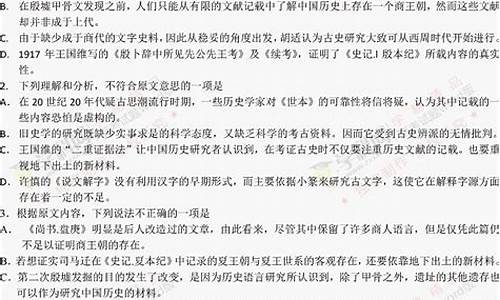您现在的位置是: 首页 > 教育改革 教育改革
2016福建高考切线,福建2016高考试题
tamoadmin 2024-06-07 人已围观
简介1.福建省高考英语口语试题2.福建省2016年高考人数3.福建高考哪一年开始考听力题4.2016年高考全国卷一卷的省份有哪些?5.福建是新高考一卷吗5.2万人。经福建省教育局官网得知,2016年福建高考人数17.5万,文科考生5.2万人,文科生在总报考人数中占比为30%。福建省,简称“闽”,是中华人民共和国省级行政区,省会福州市,位于北纬2331′~2818′,东经11550′~12043′之间,
1.福建省高考英语口语试题
2.福建省2016年高考人数
3.福建高考哪一年开始考听力题
4.2016年高考全国卷一卷的省份有哪些?
5.福建是新高考一卷吗

5.2万人。经福建省教育局官网得知,2016年福建高考人数17.5万,文科考生5.2万人,文科生在总报考人数中占比为30%。福建省,简称“闽”,是中华人民共和国省级行政区,省会福州市,位于北纬23°31′~28°18′,东经115°50′~120°43′之间,地处中国东南沿海。
福建省高考英语口语试题
福建高考用新高考1卷考试,满分750分。
全国统一高考试卷(高考试题全国卷),简称全国卷,是由教育部考试中心组织命制的、适用于全国大部分省区的高考试卷,目的在于保证人才选拔的公正性。
2007年,宁夏新课标高考卷开启了新课标全国卷命题的序幕。2013年,新课标全国卷分为Ⅰ卷、Ⅱ卷。2016年,新增新课标全国Ⅲ卷,并将Ⅰ、Ⅱ、Ⅲ卷分别另称为乙、甲、丙卷。
2020年,为匹配新高考改革,新增新高考全国Ⅰ卷、Ⅱ卷,新高考全国卷仅包括语数英(统考科目),其余科目自主命题。
2021年,取消原新课标全国Ⅱ卷(甲卷),并入Ⅰ卷(乙卷),合称全国乙卷;原新课标全国Ⅲ卷(丙卷)改称全国甲卷。外语科目中,除英语外,其余小语种(日语/俄语/法语/德语/西班牙语)各省无自主命题脊数渣权,不分卷。
2022年高考,共有全国卷4套。包括新高考全国Ⅰ卷、Ⅱ卷,全国甲卷、乙卷。共27个省级行政区使用全国卷。
新高考全国Ⅰ卷2023年使用省是江苏、浙江、河北、福建、山东、湖北、湖南、广东。新高考全国Ⅱ卷2022年使用省(市)是辽宁、海南、重庆。
普通高等学校招生全国统一考试,简称“高考”,是合格的高中毕业生或具有同等学历的考生参加的选拔性考试。
普通高等学校招生全国统一考试。教育部要求各省(区、市)考试科目名称与全国统考科目名称相同的必须与全国统考时间安排一致。
参加考试的对象一般是全日制普通高中毕业生和具有同等学历的樱悄中华人民共和国公民,招生分理工农医(含体育)、文史(含外语和艺术)两大类。普通高等学校根据考生成绩,按照招生章程计划和毕斗扩招,德智体美劳全面衡量,择优录取。
福建省2016年高考人数
2008 高考口语试题
第一、二套题 回答问题
1. How do you like your school?
2. What present will you give to your mother on her birthday?
3. What present will you give to your father on his birthday?
4. What will you do to protect yourself when an earthquake broke out?
5. What should you do before leaving the lab?
6. Please say something about either of your parents.
7. Will you introduce yourself briefly?
8. Do you like traveling? Why or why not?
9. What sports do you like best? Why?
10. What do you think of your head teacher?
11. How do you improve your English?
12. Say something about your family.
第三份
1. What do you think of Sichuan earthquake?
2. Please say something about your family.
3. Where would you like to go for your holidays?
第四套:
第一份
1. Who is your favourite singer? Why?
2. How do you improve your English reading?
3. How do you like your English teacher?
第二份
1. Do you like traveling? Where have you been? Which place impressed you most? Why?
2. How do you like your school?
3. How do you improve your English listening?
第三份
1. Who is your favourite sports star? Why?
2. How do you improve your oral English?
3. Do you like your head teacher? Why or why not?
三:
( 1 ) Dinner starts with a small dish, which is often called a starter. Some people pray before they start eating, and other people may keep silent for a moment. Then you can say “Enjoy your meal” to each other and everybody starts eating. For the starter, which you eat with the smaller pair, you keep the knife in your right hand and the fork in your left. After the starter you will get a bowl of soup – but only one bowl of soup and never ask for a second serving.
The next dish is the main course. Many Westerners think the chicken breast with its tender white flesh is the best part of the bird. Some people can use their fingers when they are eating chicken or other birds, but never touch beef or the meat on bones. It is polite to finish eating everything on your plate, so don’t take more food than you need.
( 2 ) Chuck learns how to be a good friend to Wilson. Even though Wilson is just a volleyball, he becomes fond of him. He talks to him and treats him as a friend. Chuck learns that we need friends to share happiness and sorrow, and that it is important to have someone to care about. He also learns that he should have cared more about his friends. When he makes friends with Wilson, he understands that friendship is about feelings and that we must give as much as we take.
A volleyball is certainly an unusual friend. Most of our friends are human beings, but we also make friends with animals and even things. For example ,many of us have pets, and we all have favourite objects such as a lucky pen or a diary. The lesson we can learn from Chuck and all the others who have unusual friends is that friends are teachers. Friendship helps us understand who we are, why we need each other and what we can do for each other.
( 3 ) Rock and pop music are becoming more and more similar, but
Rock and pop music are becoming more and more similar, but there are still some differences. Most pop singers use the music to make money and become rich and famous. Rock singers, on the other hand, make music their life. They play music to make themselves feel better and happier. They do not think how much money they can make from a song, instead, they sing for their feelings and live for music.
Pop songs and rock songs are written in different ways. A pop song is written in a "factory" where one person writes the words, someone else writes the music, and other musicians record it. The singer often knows little about the ideas or feelings behind the song. As for rock music, however, the singers and musicians are all able to write music and work together in a band. When one of them has a strong feeling, he or she expressed it with music and the others help build the song.
四:朗读文章
(1)In 1996,Atlanta was the host of the Olympic Games, an honor the city shared with great cities such as Sydney and Beijing.
(2)Like all of us, disabled people also need inspiration and encouragement. The magazine Literature of Chinese Blind Children was started by Xu Bailun in 1985, when he decided that there should be a magazine for blind people in China. Blind children all over China read the magazine and it has inspired many of them to believe that they can realize their dreams. The articles in the magazine are often about disabled people who have overcome difficulties and learn to live a meaningful and productive life.
About one-third of the articles in Literature of Chinese Blind Children are written by disabled authors and blind children. One of the magazine’s best-known readers is Ye Zijie, who is now a teacher in Huhhot. In the year 2000, he was invited to study in London and became the first visually impaired Chinese to study abroad. Zijie says he was inspired and motivated by the magazine: “It is very important for us to know that someone far away is also struggling as we are.”
( 3 ) When we describe or talk about new inventions, we use words and ideas that we already know. For example, when we want to
When we describe or talk about new inventions, we use words and ideas that we already know. For example, when we want to explain how a computer works, we use words like “memory”, “store” and “cut and paste”. The words are useful, but they are not quite true. A computer’s “memory” is similar to human memory in some ways, but it is also very different. A computer does keep information in its memory, but that is clearly different from other kinds of storage. We do cut and paste, but we don’t use scissors or glue. Using familiar words makes it easier for us to understand and use a new tool, but it may also make it more difficult for us to use the new invention in the best way. After all, what makes a new invention such a wonderful thing is that it allows us to do something we could not do before.
Science is not just about electronics and plastic; it is also about how we think about the world. Now that we are developing new technology at such a high pace, the true challenge is to find new ways of using it. How will we use computers in the future?
第一套
(一)
1、Do you like your monitor? Why? Why not?
2、Is your English teacher strict with you in your studies? How?
3、How are you getting along with your classmates?
(二)
1、What kind of music do you like best?
2、What do you think of your English teacher?
3、Who is your best friend? Say something about him\her.
(三)
1、Do you often use dictionaries when you learn English?
2、what date is your birthday?
3、How do you like your mother?
第二套
(一)
1、Do you often play football/table tennis/volleyball/ Why? Why not?
2、Which do you like better,watching TV or seeing movies?
3、Please say something about your family.
(二)
1、Do you enjoy music? Why? Why not?
2、What's your favourite subject?
3、What do you often do on Sundays?
(三)
1、Do you buy any presents for your parents on their birthdays?
2、What sport do you like best?
3、What are you going to do during summer holidays?
第三套
(一)
1、 Do you often listen to English programs? Why? Why not?
2、What do you do in your spare time?
3、Do you like your school? Why? Why not?
(二)
1、Do you often watch TV? Why? Why not?
2、What are you going to be in the future?
3、Who is your favourite teacher? Please say something about him/her.
(三)
1、How do you usually spend your weekends?
2、Do you have any penfriends? Please say something about him/her?
3、What do you usually do in your spare time?
第四套
(一)
1、Do you like sports? Why? Why not?
2、What did you do after the collage entrance examinations?
3、Please say something about one of your good friends.
(二)
1、Do you think collecting stamps interesting? Why? Why not?
2、What subjects did you study?
3、What do you do to improve your English?
(三)
1、What's your favourite food?
2、How long did you spend on your homework every day?
3、Could you please say something about your school?
第五套
(一)
1、Is it important to learn English? Why? Why not?
2、How many classed did you have in Senior Three every day?
3、What do you do to keep fit?
(二)
1、Do you like English? Why? Why not?
2、How are you getting along with your school life?
3、Who is your favourite teacher? Please say something about him/her.
(三)
1、What subject do you like best? Why?
2、How often do you watch TV?
3、Wh第一套
第一份
1、Why do you study English?
2、Which season do you like best? Why?
3、What are your parents?
第二份
1、How do you learn English?
2、Which subject do you like best? Why?
3、How will you spend your summer holidays?
第三份
1、Do you like English? Why?
2、How do your parents celebrate your birthday?
3、Is your hometown beautiful? Say something about your hometown.
第二套
第一份
1、When will the 29th Olympic Games be held in Beijing?
2、Do you celebrate your birthday? How ?
3、What‘s your favourite food? Why?
第二份
1、What do you usually do for your holiday?
2、What do you think you can do for the disabled people?
3、How do you spend your spare time?
第三份
1、Do you like playing computer games? Why? Why not?
2、Is the computer useful in our daily life? Please give some examples. 3、Say something about your hobby, please.
at's your interest? Please say something about it?
第三套
第一份
1、Do you think spoken English is important? Why? Why not?
2、What‘s your favorite subject?
3、How do you usually celebrate your parents‘ birthday?
第二份
1、How do you like your Chinese teacher?
2、How do you usually celebrate your birthday?
3、Do you often do something good for your class? How?
第三份
1、How much time do you spend on English reading everyday?
2、What does your father do?
3、Is the city/village where you are living beautiful?
第四套
第一份
1、What‘s your favorite sport? Why/Why not?
2、How many classes are there in your school?
3、Are you good at English?
第二份
1、Which is your favorite university?
2、What subject are you good at?
3、Could you tell me something about your family?
第三份
1、How often do you go to see a film/ 2、How far is it from your home to your school?
3、Do you often help do housework?
第五套
第一份
1、What is your favorite subject? Why?
2、How do you usually spend your weekends?
3、What do you think of your school? Please describe it.
第二份
1、How do you usually celebrate your birthday?
2、Do you want to take English as your major? Why? Why not?
3、Can you tell us something about your English teacher?
第三份
1、Do you often ask your English teacher questions? Why/ Why not?
2、How can you improve your spoken English?
3、Would you please give a brief introduction of your family?
第六套
第一份
1、How do you find your English teacher?
2、Do you love music? Why/Why not?
3.Which university do you like best? Why?
第二份
1、Do you often watch TV at home? Which channel?/Why not?
2、How do you usually spend your weekends?
3、What are you going to be in the future?
第三份
1、Do you love your hometown?Why?/ Why not?
2、What is your favorite sport?
3、What do you often do in your spare time?
第一套
I、
1、Do you like music? Why/Why not?
2、What subject do you like best? Why?
3、Why do you learn spoken English?
II、
1、Do you like spoken English? Why/Why not?
2、Do you listen to music while you are studying?Why/Why not?
3、What will you do if you have a lot of money?
III、
1、Do you think friends are important to you? Why/Why not?
2、Please say sth about one of your best friends.
3、What TV programme do you like best? Why?
第二套
I、
1、Do you often watch TV? Why/Why not?
2、What are your hobbies? Please say sth about them.
3、How do you celebrate your birthday?
II、
1、How do you spend your weekends?
2、What‘s your favourite sport? Why?
3、Do you think money is very important to you?
III、
1、Do you think friendship is important to you? Why/Why not?
2、What is your favorite food? Why?
3、Do you like animals? Why/Why not?
第三套
I、
1、Please say sth about your hometown.
2、Do you often play computer games? Why/Why not?
3、What is your favorite university?Why?
II、
1、How do you spend your spare time?
2、Please say sth about one of your good friends
3、Do you love your school? Why/Why not?
III、
1、Do you like to have a part-time job?Why/Why not?
2、How do you find your English teacher?
3.What is your favorite subject?Why?
第四套
I、
1、How do you practise your spoken English?
2、Do you remember your parents‘ birthday?How do you celebrate them?
3、What season do you like best?Why?
II、
1、Would you please introduce your family?
2、Do you like fast food?Why/Why not?
3、Do you think friendship is important to you?Why/Why not?
III、
1、Do you share your feelings with your friends?Why/Why not?
2、Are you ready to help others?Why/Why not?
3、How do you improve your spoken English?
第五套
I、
1、Do you keep any pets?Why/Why not?
2、How will you spend your holidays this summer?
3、Do you like traveling?Why/Why not?
II、
1、How do you spend your pocket money?
2、Where would you like to travel?Why?
3、Do you think that good memory is important in learning English?Why/Why not?
III、
1、What kind of music do you like?
2、What do you do to improve your English?
3、Say sth about your hobby,please.
就只找到这些 希望对你有帮助
福建高考哪一年开始考听力题
23.58万人。福建省2016年高考人数为23.58万人,普通高考17.5万人、高职入学考试6.08万人,合计录取新生20.61万人本科12.19万人、专科8.42万人,录取率为87.4%。
2016年高考全国卷一卷的省份有哪些?
2016年。福建教育局在20167年开始实行英语考试改革,将英语考试分为听力部分和笔试两部分,提高了英语听力的应用,所以高考2016年开始考听力题.福建省,简称“闽”,省会福州,位于中国东南沿海。
福建是新高考一卷吗
使用省份:河南、河北、山西、陕西、湖北、江西、湖南、江西(语文数学英语)、山东、湖南(语文数学英语综合)、湖北(语文数学英语)、广东、福建、安徽。
2016年取消省份:陕西。
高考试题全国卷:简称全国卷,它是教育部考试中心组织命制的适用于全国大部分省区的高考试卷,目的在于保证人才选拔的公正性。
从2016年开始,全国Ⅰ、Ⅱ、Ⅲ卷分别改称为全国甲、乙、丙卷。小语种(日语/俄语/法语/德语/西班牙语)高考统一使用全国卷,各省均无自主命题权,且不分甲乙丙卷。
2016年
全国绝大多数省份使用国家考试中心命题试卷。由于多数省份的加入,新课标全国卷开始分成Ⅰ卷、Ⅱ卷和Ⅲ卷。
安徽、湖北、福建、湖南、山西、河北、江西、广东、河南、山东英语及综合采用全国Ⅰ卷;甘肃、青海、西藏、黑龙江、吉林、辽宁、宁夏、新疆、内蒙古、陕西、重庆、海南语数英采用全国Ⅱ卷。
广西、云南、贵州、四川语文及文综,采用全国Ⅲ卷。
福建高考是全国一卷。
从全国卷难易程度看,整体难度比较:全国卷一>全国卷二。新课标全国卷Ⅰ和新课标全国卷Ⅱ的主要区别:本质上的区别就是难度,新课标全国卷Ⅰ > 新课标全国卷Ⅱ。全国1卷难度较大。
按教育部考试命题中心的消息来说,全国二卷主要面向西部等少数民族地区,教育不发达地区。一卷主要面向高等教育不发达的东部和中部地区。一卷难度一般在6.25,二卷一般在5.25。
通过比较可以发现,使用1卷的整体教育水平是要比2卷高一个档次的,当然,里面也有例外。比如辽宁教育就不错。但是,试卷的使用地区是与整体教育水平呈线性关系的。
高考注意事项
高考首先要在考试前一天下午提前看考场,熟悉考场周边环境,等到
扩展资料:
全国乙卷的命题特征:
1、考查内容与新课程匹配。
2、根据新课程的特征,分必考与选考题。
3、命题以考试大纲为依据,以课本教材为依托,考察学生综合能力。
高考试题全国卷简称全国卷,它是由教育部考试中心组织命制的、适用于全国大部分省区的高考试卷,目的在于保证人才选拔的公正性。
全国卷分为全国甲卷、全国乙卷和全国丙卷。从2013年开始,新课标全国卷分为Ⅰ卷、Ⅱ卷。从2016年开始,新课标全国卷分为Ⅰ卷、Ⅱ卷、Ⅲ卷。









